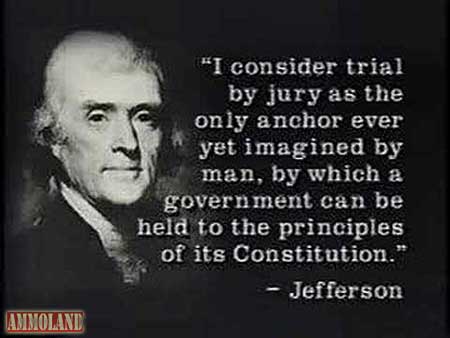Consent of the Governed & Informed Juries

Montana – -(Ammoland.com)- Thomas Jefferson was prominent among those who declared that our American system of governance was based entirely on “consent of the governed.”
This concept is further articulated in Article II, Section 1 of the Montana Constitution, which says, “All political power is vested in and derived from the people.”
This is a great concept, but how does it actually work?
It’s always been a mystery to me how some people in the 1700s could have consented for me to be effectively subservient to the omnipresent and powerful federal monster-machine that exists in 2018.
There is the ephemeral theory that if I participate in modern affairs, I actively give my consent to be governed — the “social contract” theory. If I travel on public roads, if I have a sheriff’s department available to respond to my need, or if I eat eggs for breakfast that may have been checked by the ever-helpful federal egg inspector, then I have consented to the myriad of ways that all levels of government affect me.
Honestly, I’ve never been able to cozy up to this oh-so-elastic theory.
Then there is the argument that by voting for people to represent me in legislative bodies, the city council, county commission, state legislature or Congress, I have expressed my consent for these people to enact laws with which I am bound to comply, because I have consented by voting. And, I am informed, I may also be punished if I fail to comply with these laws, punishment to which I have also consented in advance by voting.
However, there is one available mechanism whereby consent of the governed, or lack thereof, may be expressed very directly. That is through the power of informed juries.
It used to be a common understanding in American civics that jurors had the prerogative, even the duty, to vote in the privacy of the jury room to acquit an accused person if the juror believed that the person was being tried for violating an unfair or improper law, or under a law improperly applied.
Unfortunately, this principle is no longer taught in civics classes. Rather, judges tell jurors that their votes for guilty or not guilty must be based only on the facts of the case, and only the judge may consider the propriety of the law.
Despite this misinformation from judges, jurors still know about and jurors still act upon their unquestionable power to vote the juror’s conscience in the privacy of the jury room. This is one way the consent of the governed may actually be applied in our modern era.
When northern juries refused to convict their neighbors of violating the Fugitive Slave Act before the Civil War, for aiding runaway slaves, these juries were withholding the consent of the governed. Fast-forward to current times, when a district court judge could not find enough jurors to constitute a jury, jurors willing to convict someone for simple possession of marijuana, he had no choice but to dismiss the charge. These prospective jurors were simply withholding their consent to be governed in this particular way.
Although just how consent of the governed is applied in our modern era remains less than clear, certainly one shining example of that principle is informed juries that refuse to enforce bad laws, laws for which jurors simply refuse the consent of the governed.
Gary Marbut is president of the Montana Shooting Sports Association, accepted as an expert in state and federal courts concerning self defense and use of force, and the author of “Gun Laws of Montana.”
